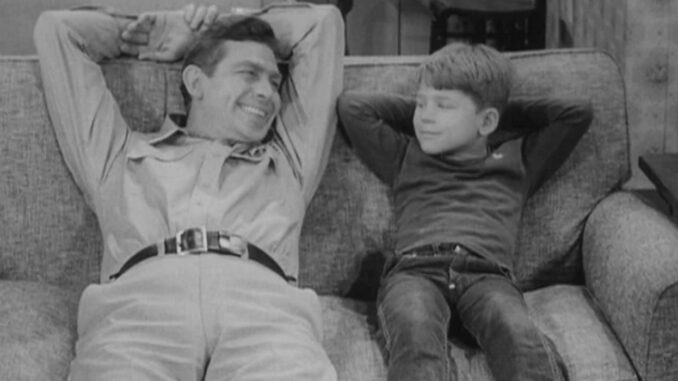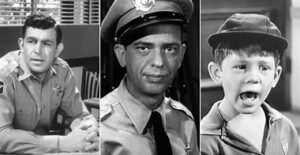
The Andy Griffith Show is etched in classic TV history as one of the most beloved sitcoms of all time. Wholesome, warm, and loaded with charm, the show was more than just a comedy — it was a slice of Americana. But according to Ron Howard, who played young Opie Taylor, not every joke made it past Andy Griffith’s watchful eye. Some were shot down before they ever made it to air.
In this behind-the-scenes look, we’ll explore how Andy Griffith wielded creative control, why certain jokes got the axe, and how that shaped the show’s iconic tone. Let’s take a stroll down the dusty roads of Mayberry and peek behind the curtain.
The Man Behind Mayberry: Andy Griffith’s Vision for the Show
Andy Griffith Didn’t Just Star — He Steered
Andy wasn’t just the face of the show; he was its backbone. From the very beginning, Griffith had a specific tone in mind. He wanted The Andy Griffith Show to be more than just laughs — he wanted it to reflect heart, values, and timeless small-town wisdom.
Why Griffith Said “No” to Certain Jokes
According to Ron Howard, Griffith often vetoed jokes that felt too “slick” or modern. If a gag didn’t feel authentic to the Mayberry spirit, it didn’t make the cut. Griffith had a radar for anything that felt out of place — and he wasn’t afraid to use it.
Ron Howard Spills the Tea: How Andy Controlled the Humor
A Father Figure On-Screen and Off
Ron Howard has long praised Andy as a mentor. But in recent interviews, he’s been more candid about how Andy’s creative authority often overruled the writers — and even the network. “He knew what fit Mayberry, and he wasn’t afraid to cut something that didn’t,” Howard shared.
“That’s Not Mayberry”: Griffith’s Famous Line
Writers learned quickly that if Andy muttered the phrase “That’s not Mayberry,” it meant rewrite time. Whether it was a sarcastic punchline or a big-city joke, if it didn’t align with the show’s values, it was out.

Writers Walked a Tightrope to Keep Andy Happy
The Balancing Act of Humor and Heart
The show’s writers had a tough task — create content that was genuinely funny, but also wholesome. No cheap laughs. No edgy punchlines. Just the kind of humor your grandma would love.
The “Griffith Filter”: Every Script Passed Through It
Nothing aired without Andy’s blessing. Even jokes that got big laughs at table reads were scrapped if Andy felt they weren’t true to the town of Mayberry. Ron Howard remembered, “You could hear the laughter, but if Andy frowned, that was it. Joke gone.”
The Jokes That Got Killed — And Why
1. Sarcasm Was Often the First to Go
While sarcasm works in modern sitcoms, it didn’t fit the sincere tone of The Andy Griffith Show. If a line felt snide or too self-aware, Andy nixed it. He preferred the humor to come from character, not attitude.
2. Big-City Humor Didn’t Belong in Mayberry
Writers sometimes snuck in urban-style jokes — think irony or wordplay with a “New York” flavor. Griffith saw those as breaking immersion. Mayberry wasn’t New York, and he didn’t want it to feel that way.
3. Romantic Jokes Were Carefully Curated
Anything too suggestive or flirty often ended up on the cutting room floor. Even Barney’s awkward romancing of Thelma Lou had to toe the line. The humor had to be sweet, never risqué.
4. Slapstick Was Dialed Down
While some physical comedy remained — especially in Don Knotts’ performances — too much slapstick risked feeling cartoonish. Griffith wanted laughs, not gimmicks.
The Hidden Genius: Why Andy Might Have Been Right
Timeless Over Trendy
By killing certain jokes, Griffith preserved the show’s timeless feel. Many 1960s sitcoms feel dated today — but The Andy Griffith Show still resonates. Its humor feels gentle, human, and universal.
A Masterclass in Tone Control
TV writers today still study the show as a masterclass in tonal consistency. That’s largely thanks to Andy’s instinctive editing.
Ron Howard Reflects: What He Learned Watching Andy
A Lesson in Creative Integrity
Howard credits Griffith with teaching him the value of tone, pacing, and integrity in storytelling. “He knew when something felt false. And he always chose truth over trend.”
Andy’s Legacy Lives On in Howard’s Work
Whether it’s Apollo 13 or A Beautiful Mind, you can see echoes of Mayberry in the way Howard tells stories — with clarity, warmth, and an eye for emotional truth.
🎤 What Other Cast Members Said About Andy’s Editing
Don Knotts Respected It — Mostly
Though he thrived on laughs, Don Knotts understood Andy’s vision. He once said, “Andy was the grounding wire. He made sure the whole thing didn’t float away into silliness.”
Frances Bavier (Aunt Bee) Often Struggled With the Limits
Frances reportedly had creative differences with Griffith, feeling that some emotional or dramatic elements could be pushed further. But ultimately, Andy’s decisions shaped the show’s feel.
What This Says About Comedy Today
Would Griffith’s Approach Work Now?
In today’s age of edgy humor and fast-paced gags, Andy’s style might seem old-fashioned. But in an era of streaming saturation, maybe people are craving something quieter, more sincere.
The Return of “Nice TV” — Thanks to Shows Like Ted Lasso
There’s a growing wave of “kind” shows — and they owe a debt to The Andy Griffith Show. It proved that you don’t need shock or snark to entertain.
Final Thoughts: What Got Left Out Might Be the Secret Sauce
In an industry that often chases the next laugh, Andy Griffith dared to subtract. He removed jokes, dialed back, and made room for something rare — authenticity. Ron Howard’s reflections give us a rare peek into the inner workings of one of TV’s most iconic series, showing us that sometimes the jokes you don’t tell are the ones that define a show’s legacy.
❓FAQs
1. Why did Andy Griffith reject certain jokes on The Andy Griffith Show?
Andy wanted the show to reflect the values of small-town America. If a joke felt sarcastic, out-of-place, or not true to Mayberry, he cut it to preserve the show’s tone.
2. Did Ron Howard agree with Andy Griffith’s decisions?
Yes. While Ron Howard recognized that some jokes were funny, he respected Andy’s vision and credits him with teaching valuable lessons about storytelling and tone.
3. Were there any conflicts on set because of Andy’s edits?
There were occasional creative disagreements, especially with writers or actors who wanted more flexibility. But most respected Andy’s judgment.
4. How did Andy’s joke censorship affect the show’s success?
Positively. It gave the show a timeless, consistent tone that still resonates with audiences today.
5. Are there other shows where actors had this much control over the script?
Yes, but it’s rare. Shows like Seinfeld or The Office gave certain actors influence. Still, Andy’s control was unique for its time, especially in a network-dominated era.
Would you like me to expand this into a downloadable PDF or turn it into a video script for YouTube?